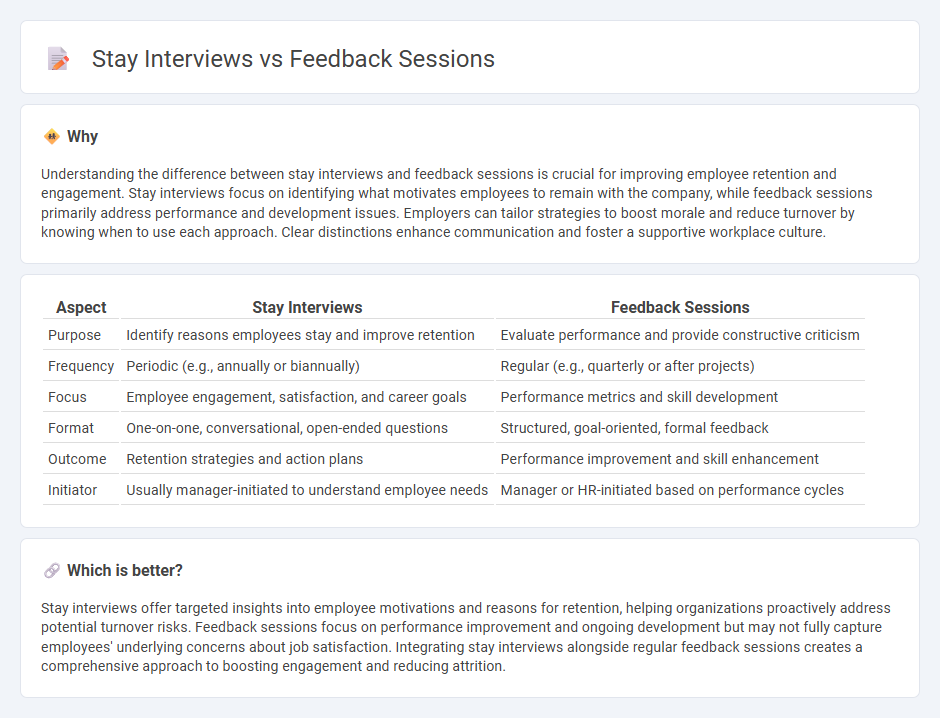
Stay interviews focus on understanding employees' motivations and reasons for remaining with the company, aiming to enhance retention by addressing specific needs and concerns. Feedback sessions primarily concentrate on evaluating performance and providing constructive guidance for improvement, often tied to short-term goals and projects. Discover how leveraging both strategies can significantly boost workforce engagement and productivity.
Why it is important
Understanding the difference between stay interviews and feedback sessions is crucial for improving employee retention and engagement. Stay interviews focus on identifying what motivates employees to remain with the company, while feedback sessions primarily address performance and development issues. Employers can tailor strategies to boost morale and reduce turnover by knowing when to use each approach. Clear distinctions enhance communication and foster a supportive workplace culture.
Comparison Table
| Aspect | Stay Interviews | Feedback Sessions |
|---|---|---|
| Purpose | Identify reasons employees stay and improve retention | Evaluate performance and provide constructive criticism |
| Frequency | Periodic (e.g., annually or biannually) | Regular (e.g., quarterly or after projects) |
| Focus | Employee engagement, satisfaction, and career goals | Performance metrics and skill development |
| Format | One-on-one, conversational, open-ended questions | Structured, goal-oriented, formal feedback |
| Outcome | Retention strategies and action plans | Performance improvement and skill enhancement |
| Initiator | Usually manager-initiated to understand employee needs | Manager or HR-initiated based on performance cycles |
Which is better?
Stay interviews offer targeted insights into employee motivations and reasons for retention, helping organizations proactively address potential turnover risks. Feedback sessions focus on performance improvement and ongoing development but may not fully capture employees' underlying concerns about job satisfaction. Integrating stay interviews alongside regular feedback sessions creates a comprehensive approach to boosting engagement and reducing attrition.
Connection
Stay interviews and feedback sessions are crucial tools in employee retention and engagement strategies. Stay interviews proactively assess employee satisfaction and uncover potential issues before they lead to turnover, while feedback sessions provide ongoing communication that reinforces connection and professional growth. Together, these practices create a continuous dialogue that helps organizations identify concerns, recognize achievements, and foster a supportive work environment.
Key Terms
Performance Evaluation
Feedback sessions primarily assess employee performance through regular evaluations aimed at improving skills and productivity. Stay interviews focus on understanding employee satisfaction and retention factors to prevent turnover. Explore the differences in purpose and outcomes between these two essential performance evaluation tools.
Employee Retention
Feedback sessions provide ongoing performance reviews and skill development opportunities, fostering employee growth and satisfaction. Stay interviews specifically address employee concerns and motivations to proactively reduce turnover by understanding retention drivers. Explore how combining both approaches can enhance overall employee retention strategies and create a more engaged workforce.
Constructive Dialogue
Feedback sessions center on evaluating past performance to identify areas for improvement and development, fostering a culture of continuous growth. Stay interviews emphasize understanding employee motivations and concerns to enhance retention and job satisfaction. Explore the distinct benefits of both approaches to strengthen constructive dialogue within your organization.
Source and External Links
Using and preparing feedback sessions properly - Feedback sessions are HR tools where employees and managers exchange constructive feedback for self-development, performance improvement, and future planning, emphasizing clear, objective communication and mutual agreement on goals.
Facilitating Discussion-Based Feedback Sessions with Students - Effective feedback sessions involve setting clear goals, using targeted questions to explore specific topics, and structuring discussions in stages, such as individual reflection, small group talk, and whole-group sharing, to foster open dialogue.
How to facilitate an effective feedback session - Feedback sessions are structured conversations between employees and managers aimed at sharing perspectives, addressing performance, and setting goals, which can be formal or informal and are central to fostering continuous improvement and engagement.
 dowidth.com
dowidth.com